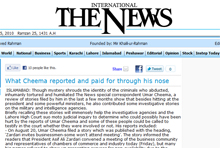Cheema was abducted, beaten, and humiliated over the weekend in Islamabad (see our alert from Wednesday.)
The group editor for The News (the largest English-language paper in Pakistan, published by the Jang Group of Newspapers), Shaheen Sehbai, who is traveling in the U.S., was the first to contact me about the abduction. I wasn’t able to get through to Umar until Wednesday evening, after we had posted our alert. His first message was typical of him: “Hope you’re doing OK. I’m fine and in high spirits.”
When I asked who had done this to him, his answer was measured: “The men were in police uniforms but they weren’t policemen, I suppose. I did a number of stories that were highly critical of the army, the federal government, including President Asif Ali Zardari. I can’t precisely say who could be behind this attack but I believe that army-controlled intelligence agencies and civilian agencies should explain their position.”
In The News‘ account of the abduction, Umar said his kidnappers had asked him if he was trying to discredit the government with his reporting and bring about another military government–historically the default solution for tottering Pakistan presidencies. That still begs the question of who took him, but if you want to see whose list of enemies list Umar might be on and why he’s not sure who would so terribly abuse him, The News posted his more recent stories with the terrific headline “What Cheema reported and paid for through his nose.”
Even though we reported that Prime Minister Syed Yusuf Raza Gilani called Cheema to assure him the attack would be thoroughly investigated, there is good reason to doubt that it will be. At least in terms of murders, there has been no investigation with subsequent prosecution of anyone who has killed a journalist in Pakistan beyond that of the case of the American Daniel Pearl, The Wall Street Journal reporter who was abducted in January 2002 and killed about a month later.
In our alert on Umar’s ordeal, I quoted the English-language daily Dawn‘s widely reprinted editorial, which said: “No half-hearted police measures or words of consolation from the highest offices in the land will suffice in the aftermath of the brutal treatment meted out to journalist Umar Cheema of The News. This paper’s stand is clear: the government and its intelligence agencies will be considered guilty until they can prove their innocence.”
It’s worth reposting that. Arguably, President Asif Ali Zardari’s government hasn’t been as heavy-handed as the Musharraf government that came before him, but Zardari’s record is hardly admirable.
The targeted, politically motivated attack on Umar is precisely the sort of event that, even amid the rest of Pakistan’s woes, serves as a turning point in closing the space in which journalists operate. Dawn‘s editorial got it dead right when it said: “His torture was a message to not just an individual but the entire journalistic community in Pakistan that a certain type of criticism will no longer be tolerated. The government must probe this incident with honesty of purpose, which is a bit of an ask, and come clean with its findings. Journalists have been killed in Pakistan before. This time though a media person was abducted, subjected to physical pain and then released to send a message to writers at large.”
That’s the significance of Umar Cheema’s abduction–it was a message sent to all journalists in Pakistan, and it may not have come from the Taliban, or al-Qaeda, or any one of the scores of groups engaged in combat with the legitimate authorities across the country. As Dawn says, it is “a bit of an ask” to expect an honest investigation given Pakistan’s past record in incidents like these. But it’s still not too much to ask.
